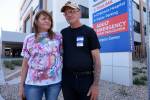Beauty often comes from the broken places
Pop, am I broken?"
I'm doing dishes, and the question catches me off-guard. Out of context. I turn, hands still in the sink, to see my eldest son, Jonathan, standing in the doorway. I offer him an expression of unknowing.
He points at the huge bandage on his right eye. He is convalescing from his fifth eye surgery in three years. He asks again, "Am I broken?"
My boy has Marfan's syndrome. Named after Antoine Marfan, a French pediatrician, Marfan's syndrome is an inherited genetic disorder of the connective tissue. A dominant gene encoding a protein. It has deleterious effects on vascular smooth muscle development.
Luck of the draw. A random outcome of throwing the genetic dice. It happens.
People with Marfan's are tall. Long arms. Long fingers. Long legs. Absurdly ectomorphic. Once I learned about the disease, it was obvious, in retrospect. When Jonathan was born, it was like unfolding a ventriloquist dummy out of a suitcase. All arms and legs, with a boy attached.
I just thought he was skinny and tall.
But, in the early spring of his eighth-grade year, he walked up to me one morning and simply announced that he could see out of only the bottom half of his right eye. This time of morning, I expect "Are we out of Pop-Tarts? ... Have you seen my shoes? ... Do you have my lunch money?" But not, "I'm blind in one-half of my eye."
Two doctors later, he was in surgery that night. His retina had spontaneously detached. It missed his optic nerve by a gnat's whisker. The surgeon treated him like a man. Told him gently, clearly, but firmly, that this surgery might not save his sight. I have no idea where Jonathan found the grace and courage to absorb this news. His first lucid words upon awaking from anesthesia were simply, "Will I be able to see?"
He spent two weeks horizontal, face down, on a massage table.
And still, nobody knew what was really going on. The surgeon said that some people are just born with thin retinas.
In the fall of Jonathan's senior year, he underwent a routine physical for basketball. There was an irregularity in his EKG. Now a referral to a pediatric cardiologist. One echocardiogram later, and Jonathan's days in contact sports were over. His aorta was dangerously enlarged. Now everything began to string together. Now it all made sense.
He took it. He stood up to it and with it. He marched on. Grieving, yes, his dreams about basketball, but somehow managing it all.
Tonight is the first real fracture in his noble armor: "Pop, am I broken?"
Now I understand his question. I move, wiping my hands on my pants, my heart breaking as I step toward him. And, you know, sometimes, for reasons I don't understand, something takes over in the human heart. And just the right words pour out of your mouth.
"Jonathan ... everybody's broken. Everything is broken on this side of the grave. Nothing is completely as it ought to be."
Indeed. Chaos relentlessly stalks the everyday sensibility of order and meaning and sanity, looking for a place to sneak in. This is the human condition. The nature of creation. Sometimes airplanes crash on your house while you're barbecuing in the backyard. Sometimes tires blow, and cars, one moment speeding blithely toward a family vacation, are now upside-down in the median with broken and injured people inside. People die. Children are exploited and abused. Sometimes your most heroic efforts to love someone are not enough to make them stay.
And sometimes one stupid protein sitting on the wrong helix makes your retinas fall off and enlarges your aorta.
And then the rest of the words come. They pour out of my mouth as if dictated from a source way wiser than me: "All I can promise you, boy, is that, if you'll endure, the most beautiful things in life come from exactly those broken places."
He stares for a moment, incredulous. And then he does something he hasn't done since he fell off his bike when he was 7. He lays his head on my shoulder and cries. Heaves his grief. I feel like Atlas, holding up the Earth.
Jonathan exchanged his heroism for another, deeper heroism. He leaned into his grief, his brokenness, and surrendered. For you see, that is the only way to make a path for the beautiful things to emerge.
The most beautiful things in life come from our brokenness. I promise you.
Steven Kalas is a behavioral health consultant and counselor at Clear View Counseling Wellness Center in Las Vegas and the author of "Human Matters: Wise and Witty Counsel on Relationships, Parenting, Grief and Doing the Right Thing" (Stephens Press). His columns appear on Sundays. Contact him at skalas@reviewjournal.com.























